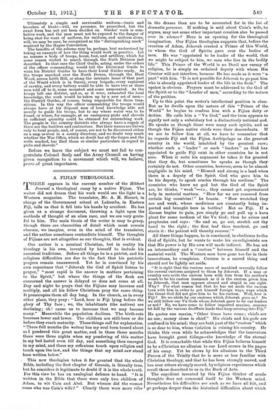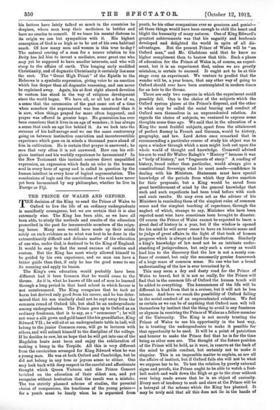A FIJIAN THEOLOGIAN.
THERE appears in the current number of the Hibbert Journal a theological essay by a native Fijian. The writer did not dream that his work would see the light in a Western magazine. The translator, Mr. A. M. Hocart, in charge of the Government school at Lakemba, in Eastern Fiji, tells us that it fell into his hands by accident. He has given us a strange document, throwing a light upon the methods of thought of an alien race, and we are very grate- ful to him. The main thesis of the writer is easy to grasp, though there are obscurities of detail which must remain obscure, we imagine, even in the mind of the translator, and the author sometimes contradicts himself. The thoughts of Fijians are not altogether as our thoughts, that is evident.
Our author is a nominal Christian, but in reality his theology is his own, invented by himself to include his ancestral traditions. Before all things he is a patriot, and his religious difficulties are due to the fact that his patriotic prayers remain unanswered. Yet he is convinced by his own experience that " Jehovah the God of Spirit listens to prayer," "most rapid is the answer in matters pertaining to the Spirit," but where the things of the flesh are concerned the answer is delayed or does not come at all. Day and night be prays that the Fijians may increase and multiply, and all his fellow Christians pray the same thing. It preoccupies them all day long. In the church, as in every other place, they pray : "Lord, here is Fiji lying before the glory of Thy face ; we, the inhabitants (the natives) are declining ; oh ! cause us to increase that we may become many." Meanwhile the population declines. The birth-rate becomes lower and lower. The children are still-born or die before they reach maturity. These things call for explanation. "Three full months (he writes) has my soul been tossed about as I pondered this great matter, and in those three months there were three nights when my pondering of this matter in my bed lasted even till day, and something then emerged in my mind, and these my reflexions touch upon religion and touch upon the law, and the things that my mind saw stand here written below."
This new theologian takes it for granted that the whole Bible, including the first chapter of Genesis, is literally true, but he considers it legitimate to doubt if it is the whole truth. For this view he has an analogical defence to hand. "It is written in the Bible that there were only two children of Adam, to wit Cain and Abel. But whence did the woman come who was Cain's wife " Clearly there were more roles in the drama than are to be accounted for in the list of dramatis personae. If nothing is said about Cain's wife, he
argues, may not some other important creation also be passed over in silence ? Here is an opening for the theological imagination. Our Fijian theologian suggests that, before the creation of Adam, Jehovah created a Prince of this World, to whom the God of Spirits gave over the bodies of men. He was " appointed to be leader of the world, that we might be subject to him, we men who live in the bodily life." This Prince of the World is no Devil nor enemy of religion, he is simply an ordained deputy with whom His
Creator will not interfere, because He has made as it were "a pact" with him. "It is not possible for Jehovah to go past him who is already appointed leader of the life in the flesh." The
upshot is obvious. Prayers must be addressed to the God of the Spirit or to the "Leader of men," according to the nature of the petition.
Up to this point the writer's intellectual position is clear. But as he dwells upon the nature of this "Prince of the World" he begins to confuse him with a Fijian deity or deities. He calls him a " Vu God," and the term appears to signify not only a subsidiary but a distinctively national god. He speaks as though there were many such spirits, and as though the Fijian native chiefs were their descendants. If we are to follow him at all, we have to remember that be regards Fiji and the Fijian Archipelago as the greatest country in the world, inhabited by the greatest race; whether such a " leader " or such " leaders " as God has appointed to guide Fiji exist in other countries he is not sure. When it suits his argument be takes it for granted that they do, but sometimes he speaks as though they certainly do not. Other countries, however, seem to be almost negligible in his mind. " Blessed and strong is a land when
there is a deputy of the Spirit God who gave him to be his deputy, to speak oracles through his medium." The countries who know no god but the God of the Spirit are, he thinks, " weak "—i.e., they cannot get supernatural help in material matters. " How far we are removed from
certain big countries !" he boasts. " How wretched they are and weak, whose medicines are constantly being im- ported and brought here in bottles ! Not so Fiji. If a
disease begins to pain, you simply go and pull up a kava plant for some medium of the Vu God ; then he arises and prophesies and says : ' So and so, go out, stretch out thy hand to the right ; the first leaf thou touchest, go and strain it : the patient will thereby recover.' "
All these things happen, he is convinced, in obedience to the God of Spirits, but he wants to make his co-religionists see that His power is by His own will made indirect. He has set
an intermediary and a " custom " between himself and the material world. The Western men have gone too far in their innovations, he complains. Custom is a sacred thing and should not be lightly set aside.
"It is right that the various races of mankind severally follow the several customs assigned to them by Jehovah. If a man or country sets aside the custom born with him from his mother's womb to be his custom inasmuch as it is the custom given him by Jehovah, that man appears absurd and stupid in our sight. Why ? For what reason but that be has set aside the custom born with him in order to get himself foreign ways, ways which
the Great God did not give him to be his custom. Well, how is Fiji ? Do we abide by our customs which Jehovah gave us ? Do
we still follow our Vu Gods whom Jehovah gave to be our leaders or not ? No, we have come to follow imported maxims, maxims let fall by the various destitute lands that keep entering into Fiji" He quotes one maxim, "Other times have come ; chiefs are no use; money alone is chief." His chiefs and his gods are confused in his mind; they are both part of the "custom" which is so dear to him, whose violation is ruining his country. He thinks this even while he acknowledges that the innovators
have brought great tidings—the knowledge of the eternal God. It is remarkable that while this Fijian believes himself to be a Christian no allusion to our Lord occurs in the pages of his essay. Yet he shows by his allusions to the Third Person of the Trinity that he is more or less familiar with Christian theology, and that he has been strongly moved, and has seen others strongly moved, by religious experiences which recall those described to us in the Book of Acts.
The expedient invented by this Fijian thinker of crude thoughts does not commend itself to the Western mind. Nevertheless his difficulties are such as we have all felt, and go perhaps deeper than the historical difficulties about which
his betters have lately talked so much in the countries he despises, where men keep their medicines in bottles and have no oracles to consult. If we trace his mental distress to its origin we can but sympathize with it. His highest conception of God is so high as to be out of his own habitual reach. Of how many men and women is this true to-day ? The natural craving of a man for a nearer relation to his Deity has led him to invent a mediator, some great one who may yet be supposed to have smaller interests, and who will stoop to the affairs of earth. This longing early modified Christianity, and of dogmatic Christianity it certainly lies near the root. The " Great High Priest" of the Epistle to the Hebrews is a symbolic expression, giving voice to an emotion which lies deeper than all dogmatic reasoning, and can never be explained away. Again, his at first sight absurd devotion to custom has stood in the way of religious development since the world began. We have all, or all but a few of us, a sense that the ceremonies of the past came out of a time when somehow the supernatural was less unnatural than it is now, when things prayed for more often happened, and prayer was offered in greater hope. No generation has ever been conscious that it lives in an age of wonders ; it has always a sense that such an age lies behind it. As we look into the recesses of his half-savage soul we see the same controversy going on between instinctive conviction and incontrovertible experience which goes on in minds a thousand years ahead of him in cultivation. He is certain that prayer is answered ; he sees that very often it is not answered. How can his reli- gious instinct and his worldly experience be harmonized ? In the New Testament this instinct receives direct unqualified expression, an expression which finds an echo in the human soul in every hour of agony and is called in question by the human intellect in every hour of logical argumentation. The conclusions of logic and the convictions of the soul have never yet been harmonized by any philosopher, whether he live in Europe or Fiji.











































 Previous page
Previous page